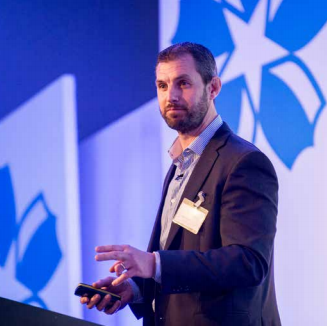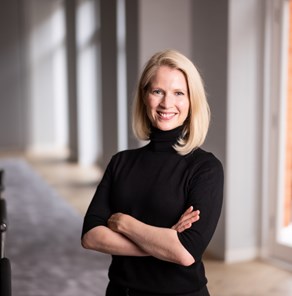
The importance of talent
Passionate founders may start a business, but growing it requires the right team. Finding, developing, retaining and nurturing this is key.
Inflexion understand the importance of people to drive a company’s success. We are constantly developing and strengthening our global network of senior industry professionals by hosting mutually beneficial events about topics challenging different industries. These help us to understand what good looks like, keeps us informed around industry trends and themes, and also provides deal angles and opportunities for our portfolio companies.
Supporting evolving companies is key since good leadership is situational. As businesses continue to develop and grow their talent, their requirements evolve. Inflexion has a clear methodology for monitoring these changing needs and ensuring their evolving requirements are proactively met.
In addition, we are constantly connecting our businesses across the portfolio to share best practice, to lean on each other’s experiences and to support ongoing development. But there isn’t a ‘one-size-fits-all’ for talent. We aim to equip our management teams with the right experiences, skills and competencies to support them for success. Our network and how we develop it is crucial to supporting this future growth.

Alcumus CEO, Alyn Franklin talks about people focus
“Happy employees deliver a better customer service,” states Alyn, who identified people as the heart of the business when he became CEO in September 2017. “It was clear to me that the biggest opportunity was to galvanise our 550 staff behind a common goal. All the company’s know-how was in their heads, but they weren’t particularly engaged.”
Turning that around wasn’t a small feat: he met with every employee, wherever they were based. “We had really open discussions about our hobbies, likes, dislikes, career aspirations and life at home, away from the workplace. I shared with them what I thought my priorities for the business should be and asked for their thoughts; it gave me a cross-section of input from across the business as well as an understanding of the language they used.” Their input informed a set of values utilising this language, and these drive the firm’s reward and recognition today.
“As humans we are naturally tribal and we really struggle when we don’t have a sense of belonging, so I felt it was important to create a community within Alcumus.”
Recruitment for Alcumus reflects the people focus – senior management was hired based on leadership ability first and specialist skills second. In September 2018 Alcumus appointed a Chief People Officer to drive employee engagement. “It shows commitment to the value we place on our employees, the role is also the guardian of our values and holds us to account.” Even as the business grows, Alyn is part of the induction process for every new employee.
“Continuity of staff is very important. Looking after people isn’t just the right thing to do, it’s good business sense.”

Recognising potential is key says Calco Managing Director, Kelly Grooteman
Calco has an unorthodox approach to managing talent: the Dutch IT staffing business prioritises people’s personalities and potential over their degrees and formal qualifications. “We look at talent much differently to other companies. It’s less about their degree and more about their talent – who are they as a person and who can they become, rather than the qualification they achieved in the past,” explains Kelly.
“We look at people who may have studied something else but have come across IT and want to make the switch. We assess these people – do they have very strong analytical capabilities and competences, as well as good communication and critical thinking skills? If we feel they have the potential, we provide an opportunity to start their career here by training them in two months through our ‘Masterclass’. We are the only company in the Netherlands that do this. It has a meaningful impact on people’s lives as it affords them an opportunity to shift their career in an efficient way.”
With the demand for strong IT professionals outstripping supply, this may help fill the gap. And it works: One of Calco’s Masterclass professionals came from a large investment bank in the Netherlands. He’d applied for an internal IT role within the same bank, but was rejected owing to his lack of formal qualification. He then joined Calco’s Masterclass, reapplied for the same role at the same bank, got the position and went on to become the firm’s employee of the quarter. Ironically, the bank then asked Calco where it sourced its strong candidates from. Says Kelly, “We told them ‘he came from you!’. It’s about finding and enabling the potential of people.”

You need the right attitude
according to Ray Pierce, Succession Non-Executive Chairman
The right people with the right attitudes is crucial, and a firm’s ability to deal with people is severely limited if it hasn’t hired the right people in the first place, according to Ray.
“Most of our growth has been acquisitive, so we have brought a lot of people into the company whom we have not specifically recruited. There are challenges that come from that. Buying into businesses of 5-12 people and creating a business of 600-700 people brings the need to up-skill, if you can, a lot of people who you don’t really know. It’s meant recruiting external people into senior middle management, ensuring firstly the right attitude and secondly helping them develop the skills needed to work for Succession.”
Another challenge is the attitudes of people, Ray says. “We buy small, regulated businesses with a diverse range of very talented personalities who have never worked in corporate businesses and who are suddenly working in a mediumsized corporate. It means we need to do talent management well.”
Founder Simon Chamberlain’s sudden and sad passing left a gap, since incoming businesses saw the founder as a reason they sold their companies and joined Succession – Ray describes Simon as very entrepreneurial, driven and iconoclastic. “Initially there was a tremendous drive that made everyone want to do their best, but last year was more difficult as the enthusiasm and drive waned. We needed to find a way of re-engaging these individuals, and from about Q3 2018 we made progress. It’s not a finished job and we’re continuing to find the best way of doing it.”
Contact


